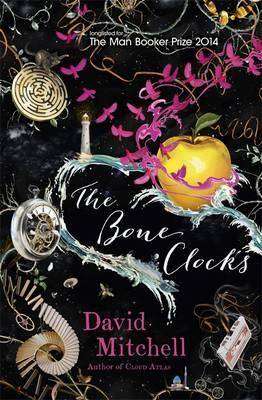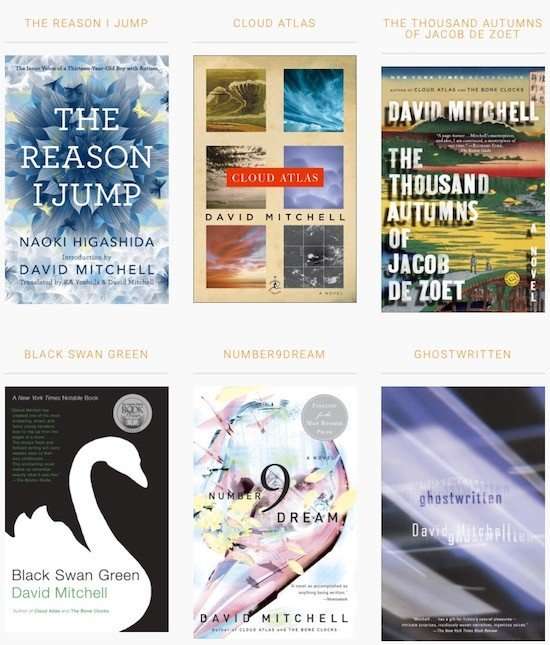The Bone Clocks by David Mitchell, Review: Literary performance
The Bone Clocks by David Mitchell (Cloud Atlas) is a kaleidoscopic story of an unusual woman’s life, a metaphysical thriller and a profound meditation on mortality and survival. Read our full review.
The Bone Clocks Book Synopsis:

Longlisted for the Man Booker Prize 2014
One drowsy summer’s day in 1984, teenage runaway Holly Sykes encounters a strange woman who offers a small kindness in exchange for ‘asylum’. Decades will pass before Holly understands exactly what sort of asylum the woman was seeking . . .
The Bone Clocks follows the twists and turns of Holly’s life from a scarred adolescence in Gravesend to old age on Ireland’s Atlantic coast as Europe’s oil supply dries up – a life not so far out of the ordinary, yet punctuated by flashes of precognition, visits from people who emerge from thin air and brief lapses in the laws of reality. For Holly Sykes – daughter, sister, mother, guardian – is also an unwitting player in a murderous feud played out in the shadows and margins of our world, and may prove to be its decisive weapon.
Metaphysical thriller, a meditation on mortality and chronicle of our self-devouring times, this kaleidoscopic novel crackles with the invention and wit that have made David Mitchell one of the most celebrated writers of his generation. Here is fiction at its most spellbinding and memorable best. (Sceptre)
Genre: Literature, Drama, Mystery, Thriller, Sci-Fi-Fantasy, Action-Adventure
Disclosure: If you click a link in this post we may earn a small commission to help offset our running costs.
BOOK REVIEW
What is an author to do when they’ve received unanimous praise so early in their career; when their body of work has garnered such a loyal international fan base that publishers would fight over the rights to publish their shopping list and thus in accordance with the underbelly of human nature, every subsequent title they release becomes a pinata for literary critics?
This is David Mitchell’s plight. How does he respond?
He responds with The Bone Clocks – one of the biggest and brightest pinatas ever seen, bursting with goodies for all party guests.
A literary performance
For the fans of his literary prose, he puts on a superb performance. In The Bone Clocks the tricks don’t creep up on you – they are on full display – it is an overtly literary novel. But is that a good thing? I can only answer with an analogy. When you go to see a magician perform you know you will be presented with trickery and sleight of hand – it’s what you were expecting, its signposted, it’s why you bought the ticket. Now I don’t like magic shows (I’m not impressed by people hiding things up their sleeves) but I did enjoy this novel. I have much deeper respect for this performer’s craft.
Yes, there’s authorial decadence, along with countless passages of profundity.
Power is lost or won, never created or destroyed. Power is a visitor to, not a possession of, those it empowers…. Power is crack-cocaine for your ego and battery-acid for your soul. Power’s comings and goings, from host to host, via war, marriage, ballot box, diktat and accident of birth, are the plot of history. The empowered may serve justice, remodel the Earth, transform lush nations into smoking battlefields and bring down skyscrapers, but power itself is amoral.
For the critics, he preemptively mocks literary elements he’s become known for, such as stories within stories within stories and heavy use of symbolism. Just like the cover art, in The Bone Clocks Mitchell breaks the rules because he can – he’s earned his stripes and now is the time to enjoy himself a little.
Penhaligon asks, “How’s your own novel going, Richard?”…
“Evolving.” Cheeseman gazes into his glorious literary future and likes what he sees. “My hero is a Cambridge student called Richard Cheeseman, working on a novel about a Cambridge student called Richard Cheeseman. No one’s ever tried anything like it.”
Hidden treasure
This novel is a veritable treasure trove for the attentive reader. Mitchell has worked into the tale several cameos from his earlier works (e.g. the semi-autobiographical Black Swan Green) and he takes thinly-veiled potshots at writers themselves, publishers, literary agents and critics alike. For example, one of his key narrators, Crispin Hershey, is an author who never quite achieves the commercial success of his earlier works and he bemoans this scathing review of his latest work by a critic who once lauded him:
So why is Echo Must Die such a decomposing hog? One: Hershey is so bent on avoiding cliche that each sentence is as tortured as an American whistleblower. Two: the fantasy sub-plot clashes so violently with the book’s State of the World pretensions, I cannot bear to look. Three: what surer sign is there that the creative aquifers are dry than a writer creating a writer-character?
Here’s some homework dear reader: Go and read some of the reviews of The Bone Clocks recently published by the literary establishment – notice any similarities to that above?
In my humble opinion, that is very clever. A novel of time-travel, or more pointedly the time continuum, if ever there was one.
Writing style
The Bone Clocks is an immersive read, but not a quick one. Amongst the quips, Mitchell tackles numerous gritty and emotive subject matter and presents the reader with many interesting, multi-faceted characters. But for all it’s high points, it too has it’s weaknesses – some characters resonated with me more than others and some plot elements, particularly the fantastical elements, had considerably less gravitas than perhaps intended.
Mitchell’s expansive writing style and the fact the reader is on the lookout for clues to the bigger science-fiction puzzle scattered about the place, encourages a more contemplative reading approach. I didn’t want to rush it. And I’m pleased I didn’t because the ending, while entirely appropriate for the tale, was not quite the crescendo I had hoped for. In every sense, The Bone Clocks is about the journey, not the destination.
“A writer flirts with schizophrenia, nurtures synaesthesia and embraces obsessive-compulsive disorder. Your art feeds on you, your soul and, yes, to a degree, your sanity. Writing novels worth reading will bugger up your mind, jeopardise your relationships and distend your life. You have been warned.”…. “Art feasts upon its maker.”
I have great respect for Mitchell’s inimitable command of the written word, his psychological insight and storytelling ambition on display in The Bone Clocks. It doesn’t have the resonance of Cloud Atlas, but it is highly entertaining nonetheless.
BOOK RATING: The Story 4 / 5 ; The Writing 4.5 / 5 — Overall 4.25
Get your copy of The Bone Clocks from:
Amazon Bookshop US Book Depository Booktopia AU
OR listen to the audiobook FREE with Audible’s Trial (check eligibility)
UPDATE: We also reviewed Mitchell’s next novel Slade House which inhabits the same universe as The Bone Clocks.
About the Author, David Mitchell
Born in 1969, David Mitchell grew up in Worcestershire. After graduating from Kent University, he taught English in Japan, where he wrote his first novel, Ghostwritten. Published in 1999, it was awarded the Mail on Sunday John Llewellyn Rhys Prize and shortlisted for the Guardian First Book Award. His second novel, number9dream, was shortlisted for the Booker Prize and the James Tait Black Memorial Prize, and in 2003, David Mitchell was selected as one of Granta’s Best of Young British Novelists. His third novel, Cloud Atlas, was shortlisted for six awards including the Man Booker Prize, and made into a film in 2012. It was followed by Black Swan Green, shortlisted for the Costa Novel of the Year Award, and The Thousand Autumns of Jacob de Zoet , which was a No. 1 Sunday Times bestseller. Both were also longlisted for the Man Booker.
In 2013, The Reason I Jump: One Boy’s Voice From the Silence of Autism by Naoki Higashida was published in a translation from the Japanese by David Mitchell and KA Yoshida. It was an immediate bestseller in the UK and later in the US as well.

